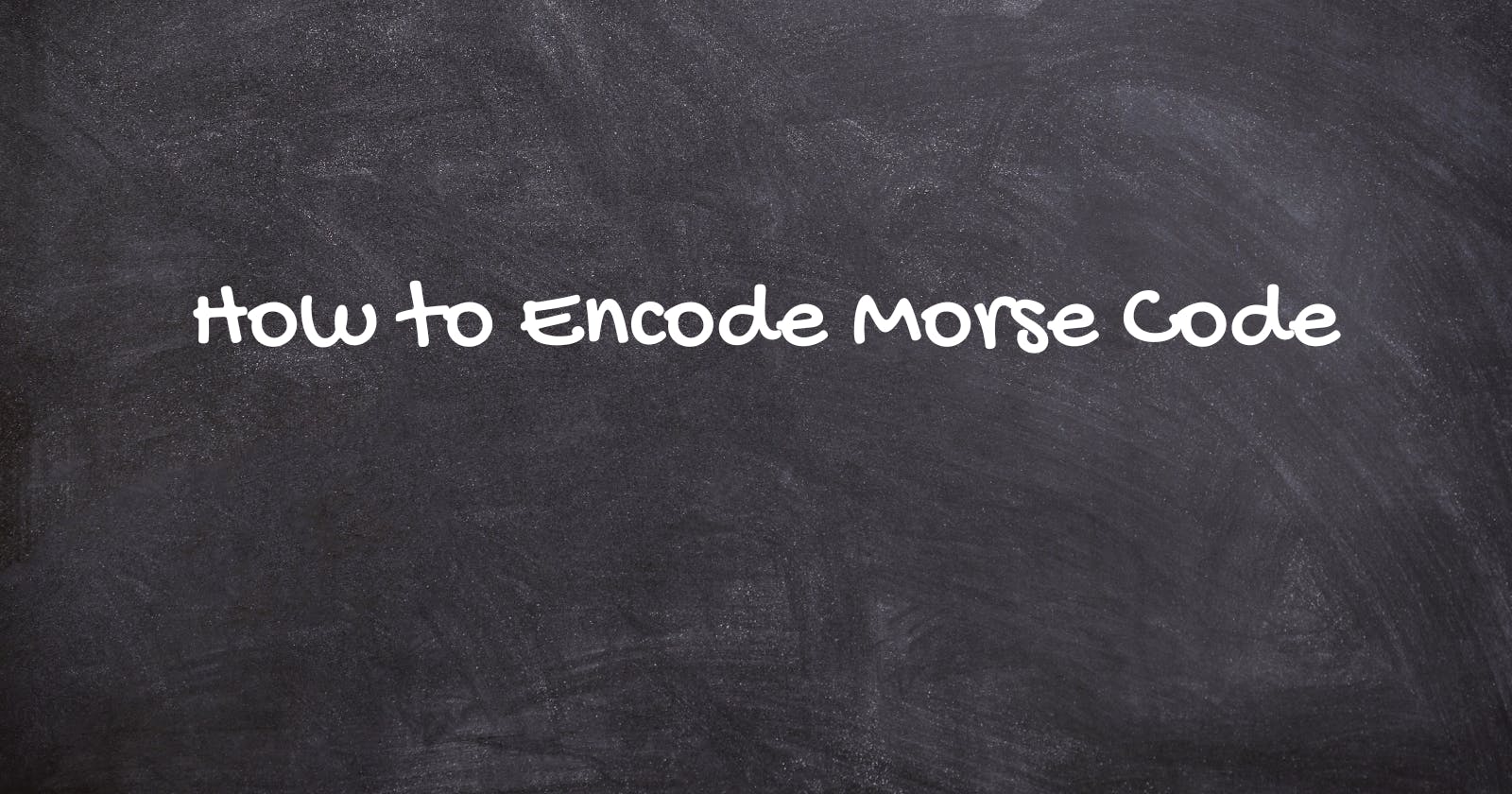How to Encode Morse Code
A C++ solution to Leetcode 804. Unique Morse Code Words using mapping and std::unordered_set to keep track of unique representations.
Problem statement
The problem involves the International Morse Code, which defines a standard way to encode letters with dots and dashes. Each English letter corresponds to a specific sequence in Morse Code, and a full table mapping each letter is provided.
For instance, 'a' is encoded as ".-", 'b' as "-...", and so on.
The full table for the 26 letters of the English alphabet is given below:
[".-", "-...", "-.-.", "-..", ".", "..-.", "--.",
"....", "..", ".---", "-.-", ".-..", "--", "-.",
"---", ".--.", "--.-", ".-.", "...", "-", "..-",
"...-", ".--", "-..-", "-.--", "--.."]
You are given an array of strings named words, where each word can be represented as a concatenation of the Morse code for each of its letters. For example, the word "cab" can be represented as "-.-..--...", which is the concatenation of "-.-.", ".-", and "-...". This concatenated Morse code representation is referred to as the "transformation" of a word.
Your task is to count the number of different transformations that can be obtained from all the words in the given array.
Example 1
Input: words = ["gin","zen","gig","msg"]
Output: 2
Explanation: The transformation of each word is:
"gin" -> "--...-."
"zen" -> "--...-."
"gig" -> "--...--."
"msg" -> "--...--."
There are 2 different transformations: "--...-." and "--...--.".
Example 2
Input: words = ["a"]
Output: 1
Constraints
1 <= words.length <= 100.1 <= words[i].length <= 12.words[i]consists of lowercase English letters.
Solution: Store the transformations in a set
Code
#include <iostream>
#include <vector>
#include <unordered_set>
using namespace std;
int uniqueMorseRepresentations(vector<string>& words)
{
vector<string> morse{
".-", "-...", "-.-.", "-..", ".", "..-.", "--.",
"....", "..", ".---", "-.-", ".-..", "--", "-.",
"---", ".--.", "--.-", ".-.", "...", "-", "..-",
"...-", ".--", "-..-", "-.--", "--.."
};
unordered_set<string> transformations;
for (string& w : words)
{
string s{""};
for (char& c : w)
{
s += morse[c - 'a'];
}
transformations.insert(s);
}
return transformations.size();
}
int main()
{
vector<string> words{"gin","zen","gig","msg"};
cout << uniqueMorseRepresentations(words) << endl;
words = {"a"};
cout << uniqueMorseRepresentations(words) << endl;
}
Output:
2
1
Code explanation
The solution begins with a predefined mapping of lowercase English letters to their corresponding Morse code representations. The Morse code representations are stored in a vector called
morse.An
unordered_set<string> transformationsis used to store the unique Morse code representations generated from the input words. This set will automatically ensure that only unique representations are stored.The code iterates through each word in the
wordsvector. For each word, it initializes an empty stringsto store the Morse code representation of that word.It then iterates through each character in the word. For each character
cin the word, it appends the corresponding Morse code representation (retrieved from themorsevector) for that character to thesstring. The mapping is accessed usingmorse[c - 'a'].After constructing the Morse code representation for the current word, it inserts the
sstring into thetransformationsset. Ifsis already present in the set, it will not be added again since sets only allow unique elements.After processing all the words, the size of the
transformationsset is returned as the result. The size of the set corresponds to the number of unique Morse code representations generated from the input words.
Complexity
This solution converts each word into Morse code based on a predefined mapping and uses an unordered set to keep track of unique representations. By inserting each representation into the set, it automatically filters out duplicates. The final result is the size of the set, which represents the number of unique Morse code representations among the input words.
Runtime:
O(N*M), whereN = words.lengthandM = words[i].length.Extra space:
O(N).
Thanks for reading! Get my book "10 Classic Coding Challenges" for FREE.

